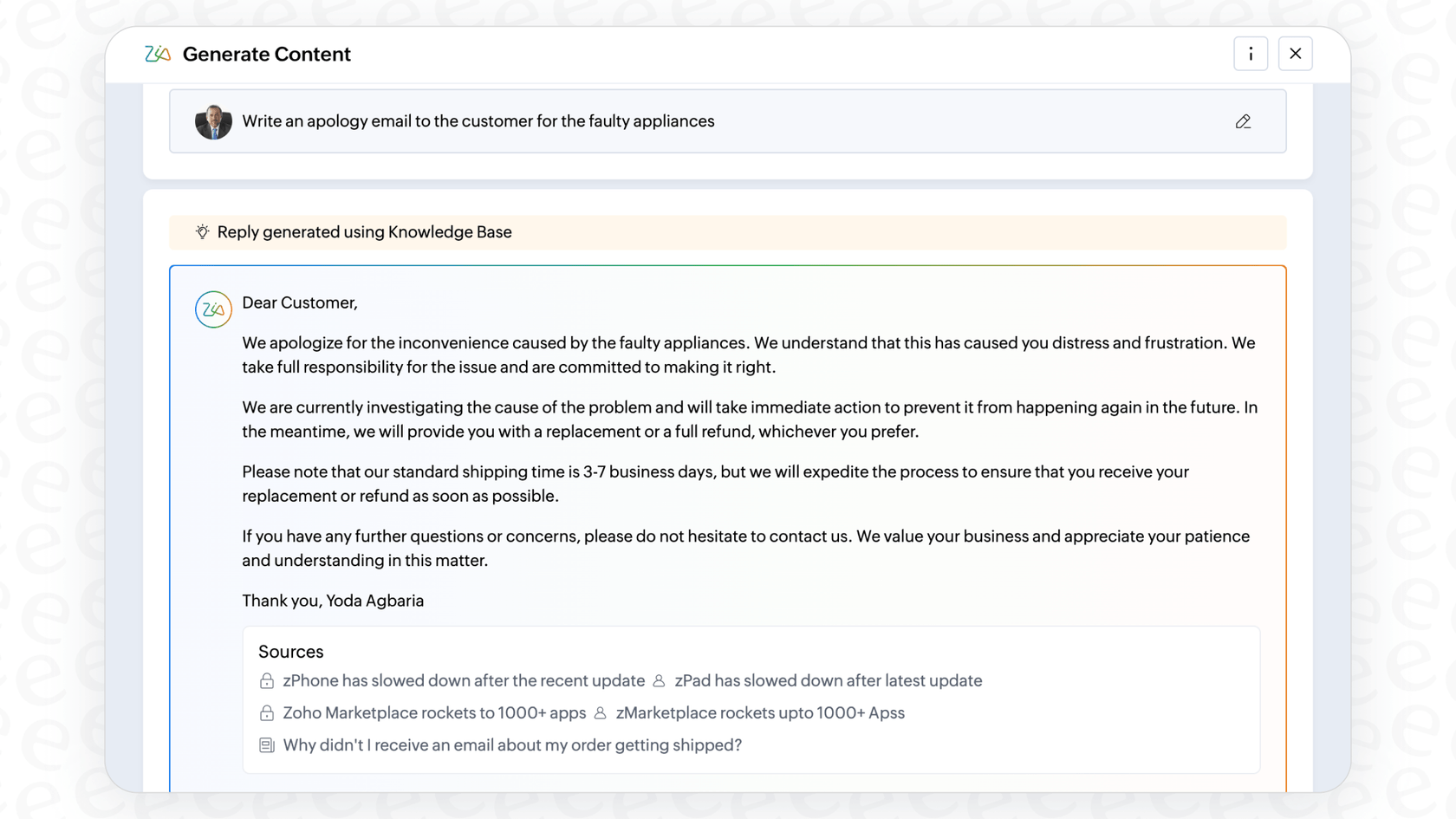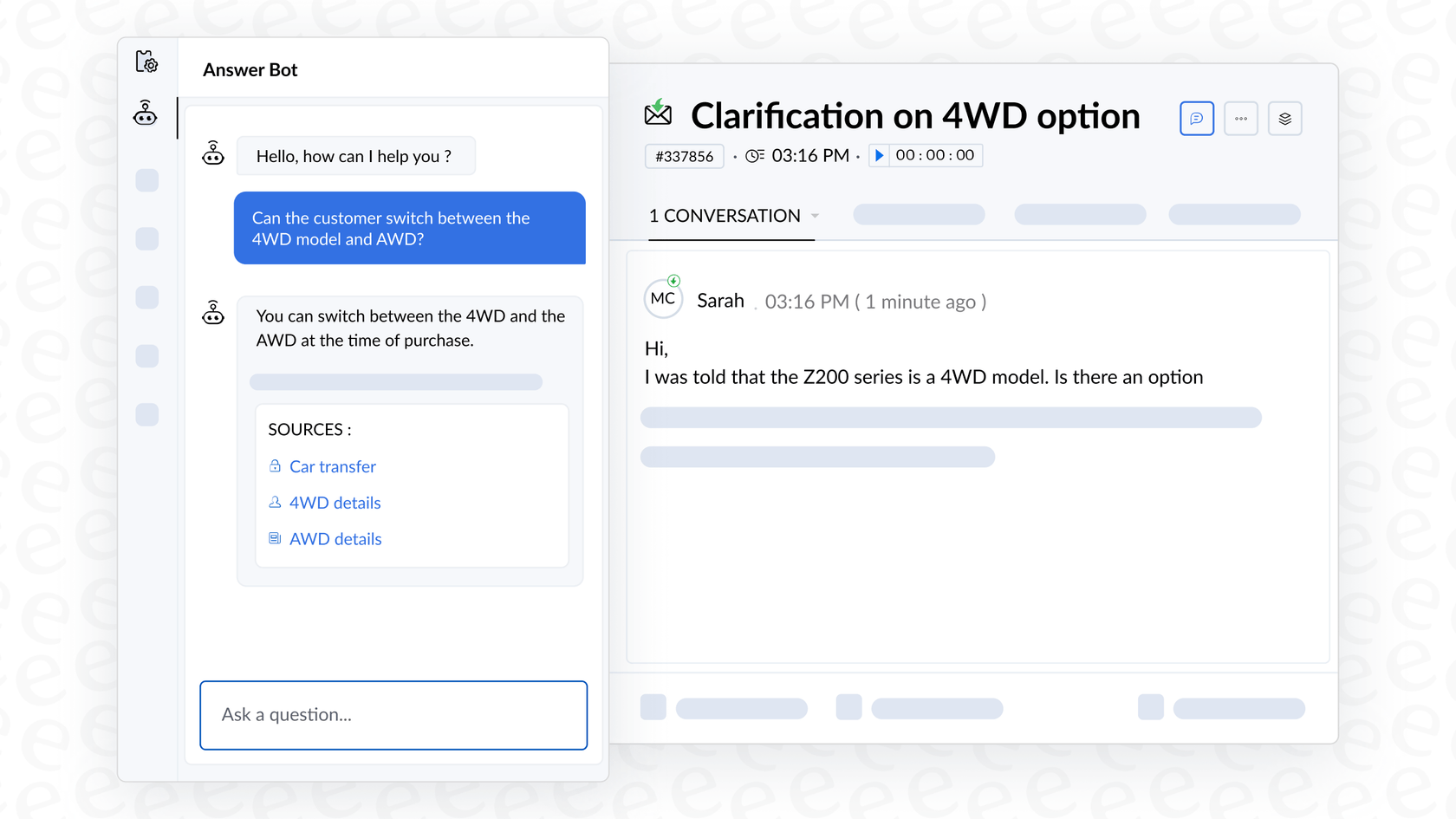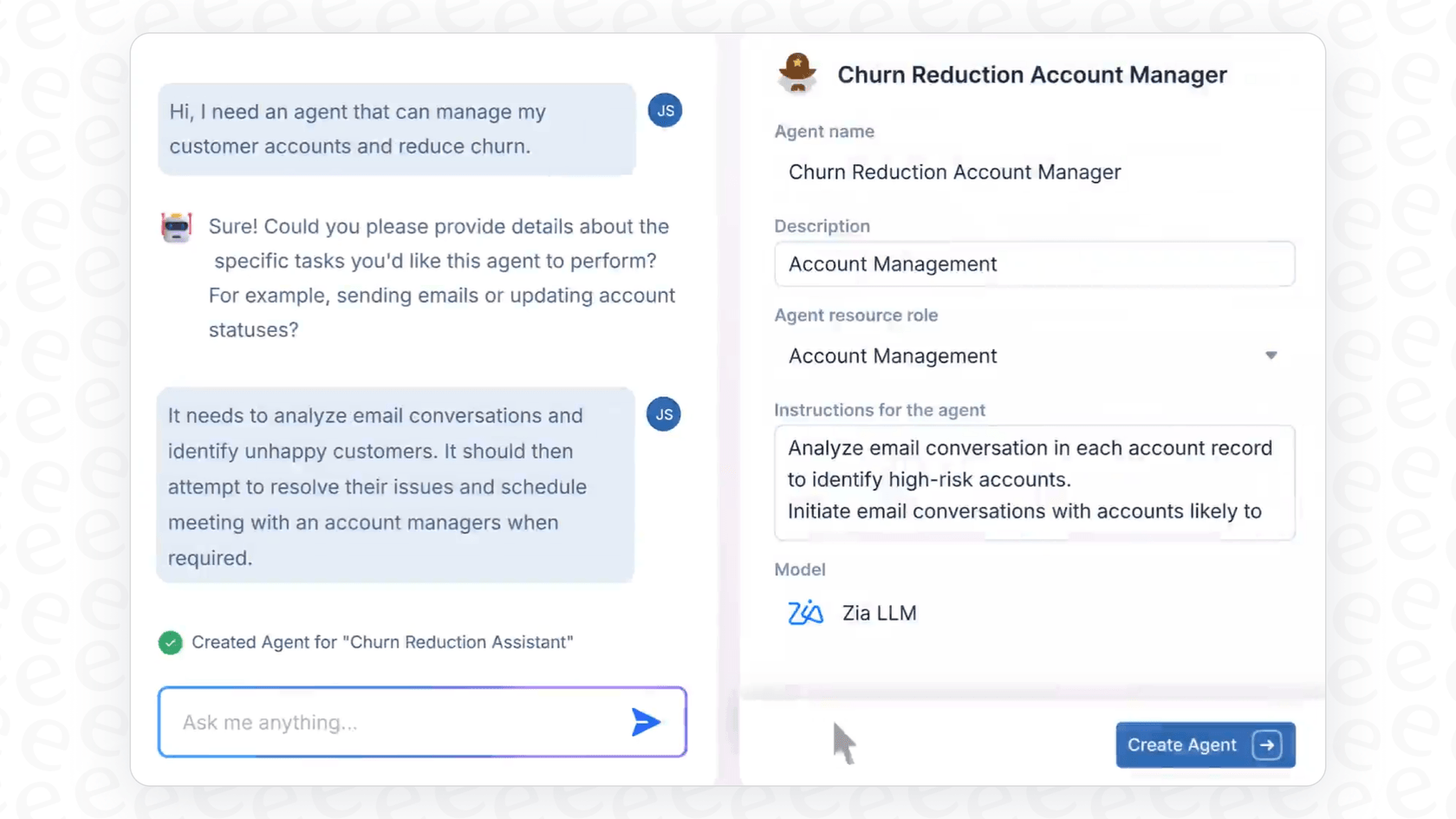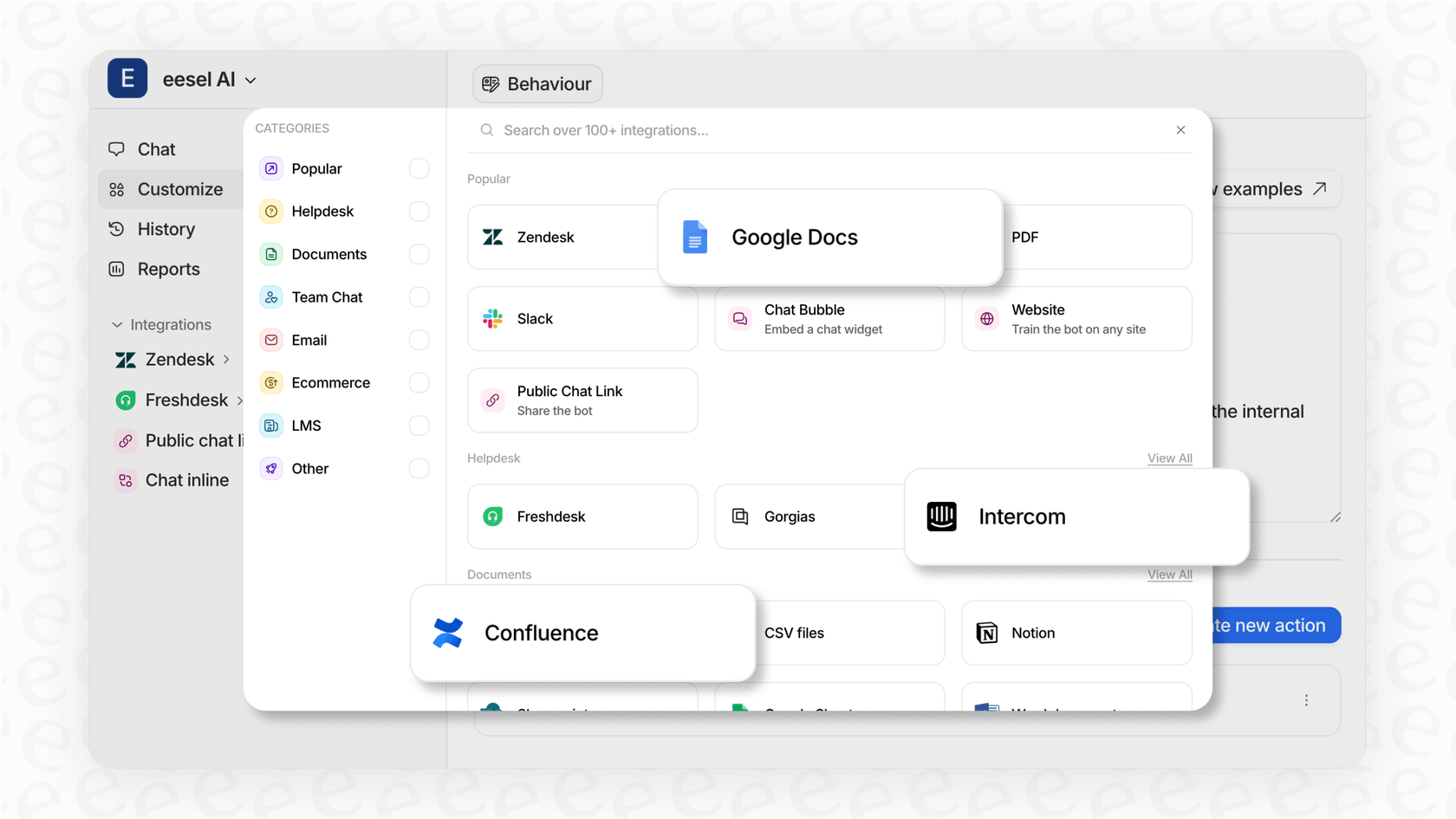
Let's be honest, the buzz around AI in customer service isn't just hype anymore. It's a real shift in how teams are trying to work smarter. Everyone is on the lookout for tools that can handle those same-old, repetitive questions, give agents the info they need in a flash, and free up people to tackle the tricky problems that AI still can't touch.
Zoho Desk, a name you've probably heard, has its own built-in AI assistant called Zia. If you're looking at Zoho, you’re probably asking yourself, "So, how good is their AI, really?" We're here to give you an honest, no-fluff look at Zoho Desk AI. We’ll walk through its main features, what it costs, and the real-world limitations you should know about before you decide to jump in.
What is Zoho Desk AI?
First things first, Zoho Desk AI isn't something you can buy on its own. It's a collection of AI features, all bundled under the name "Zia," that are baked directly into the Zoho Desk platform. Think of Zia as the brain of the operation, constantly working in the background to automate and streamline your support.

Zia's work can be split into three main jobs:
-
Conversational AI: This is what powers the chatbots that talk to customers and even help out your agents with quick answers.
-
Predictive AI: It looks at new tickets as they come in and tries to guess things like priority or category, kicking off automated workflows along the way.
-
Generative AI: This part creates new content, like writing up a quick summary of a long email chain or drafting a reply for an agent.
Because Zia is built right in, it’s tightly connected to everything else in Zoho Desk. That sounds great, and in many ways it is, but it comes with a huge string attached: you can't get the AI without committing to the entire Zoho Desk platform. If your team is already happy with your current help desk, switching everything over is a massive project and a serious commitment.
Key features of Zoho Desk AI (Zia)
Zia has features designed to make life easier for pretty much everyone: your agents handling tickets, your customers looking for help, and the managers trying to keep an eye on everything. Let’s break down what it actually does for each of them.
How Zoho Desk AI helps your support agents
Zia is designed to act as a sidekick for your support team, taking care of the boring stuff so agents can spend their time on thoughtful, human conversations.
-
Generative AI for quicker replies: Right inside the ticket editor, Zia can summarize long, messy ticket threads, figure out if a customer is happy or frustrated, and draft replies that make sense in context. It helps agents get caught up and respond way faster.
-
Automated ticket sorting: Zia's Field Predictions and Auto-Tagging features cut down on a lot of manual clicking. It reads new tickets and suggests or fills in fields like priority level or product name. This saves time and makes sure your automated rules run correctly from the get-go.
-
Help with writing quality: To keep communication standards high, Zia has a tool that checks agent responses for grammar mistakes and gives a score for readability, offering tips on how to make them clearer.

The big limitation here is that all these features are stuck inside the Zoho Desk world. Zia mostly learns from your Zoho knowledge base and past tickets, which means its advice can be a bit limited. If you have important information tucked away somewhere else, Zia will never see it.
This is a big reason why a more open tool like eesel AI can be a better fit. Instead of making you move into its ecosystem, eesel AI connects to the help desk you already have, whether that’s Zendesk, Freshdesk, or something else. It pulls together all your scattered knowledge, from past tickets and help articles to internal wikis in Confluence and notes in Google Docs, to give your agents much richer and more accurate draft replies.

How Zoho Desk AI helps the customer self-service experience
For customers who would rather find answers themselves, Zia has a couple of tools to help them out.
-
Answer Bot: This is Zoho’s chatbot. You can put it on your website or in messaging apps to give customers instant answers from your knowledge base. If the bot gets stuck, it knows to pass the conversation over to a human agent.
-
Guided Conversations: For more complex issues, you can use a simple builder to create step-by-step chatbot flows. It's like building a conversation tree that walks customers through a series of questions to troubleshoot a problem or find specific information.

The problem with these tools is pretty straightforward: they are only as good as your Zoho Desk knowledge base. If your help articles are out of date, missing key information, or just don't cover a customer's specific issue, the AI just hits a wall. That leaves the customer frustrated and at a dead end.
eesel AI's AI Chatbot was built to fix this exact issue. It doesn't just look at one help center. You can train it on a huge range of content, like your entire website, FAQs, ticket history, and even product info from e-commerce sites like Shopify. This makes for an AI assistant that's actually, genuinely helpful for your customers.
How Zoho Desk AI helps managers keep things running smoothly
Zia isn't just for agents and customers; it also has some tools for managers who need to track performance and manage workflows.
-
Zia Agents: These are pre-made, independent AI agents built to handle certain support jobs from start to finish. For instance, a "Support Specialist" agent can take on common questions, while a "Resolution Expert" can dig through old tickets to create new solution articles.
-
Anomaly Detection & AI Dashboards: Zia keeps an eye on your ticket volume and other stats. If it spots a weird spike or dip, it can send an alert to managers, helping them get ahead of potential problems and move team members around as needed.

The catch with Zia Agents is that they are pre-built. While that's convenient, it can also be very rigid if your business has unique ways of doing things. If your workflow doesn't fit into one of Zoho's neat little boxes, you might find it hard or even impossible to customize without getting developers involved.
This really highlights the different approach of a tool like eesel AI, which is all about giving you complete control. With eesel AI, you aren't stuck with pre-made roles. You can build your own automated workflows with a simple prompt editor, set up custom actions to pull order info from other systems, and decide exactly which tickets the AI should touch. This flexibility lets you mold the AI to fit your business, not the other way around.

Zoho Desk AI pricing
Zia's AI features aren't sold separately. They're included in the different Zoho Desk subscription plans. This is good if you're already on a higher-tier plan, but it also means the most useful Zoho Desk AI tools are only available if you pay for the most expensive package.

Things like the Answer Bot, the built-in generative AI, and predictive analytics are only included in the Enterprise plan. If you're on a cheaper plan, you can get some generative AI features, but you have to bring your own OpenAI API key and pay for what you use.
Here’s how the plans break down if you pay annually:
| Plan | Price (Billed Annually) | Key AI Features Included |
|---|---|---|
| Standard | $14/user/month | Generative AI (OpenAI key required), Customer Happiness Ratings |
| Professional | $23/user/month | Everything in Standard + Multi-language Help Center |
| Enterprise | $40/user/month | Everything in Professional + Answer Bot, Zia AI Assistant (native generative AI, sentiment analysis, auto-tagging, field predictions, anomaly detection) |
The bottom line is pretty clear: to get the full power of Zoho Desk AI, you have to be ready to pay for their top-tier plan and move your entire support operation onto their platform.
eesel AI lets you be much more targeted with your investment. Instead of buying a whole new help desk just to get the AI, you can add powerful AI to the platform you already know and use. eesel AI’s straightforward pricing is based on usage, and there are no per-resolution fees, so you don't have to worry about unpredictable bills.
Setting up Zoho Desk AI: What to really expect
If you're already using Zoho, turning on Zia is pretty easy. You just enable it in the settings, tell it which knowledge base to learn from, and start adding it to your workflows.
The real headache isn't flipping a switch, though. For most companies, the biggest hurdle is the monumental task of moving their entire support team and history over to Zoho Desk. This is no small thing. It means migrating years of customer conversations, carefully rebuilding every single one of your workflows, and retraining your entire team on a new piece of software. It’s a project that can drag on for months and cause a lot of disruption.
Compare that to setting up eesel AI, which is designed to be refreshingly simple and something you can do yourself. You keep your help desk and can get started in minutes. The difference is stark:
-
The Zoho Desk path: Switch platforms, migrate all your data, rebuild every workflow from the ground up, and then you can start training the AI.
-
The eesel AI path: Keep your help desk, connect eesel AI with a single click, link your other knowledge sources, and use a simulation mode to test it on old tickets to make sure everything works perfectly before you go live.
The verdict: Is Zoho Desk AI the right move for you?
So, after all that, what's the final call? Zia is a solid AI assistant that's woven deeply into the Zoho Desk platform. If your company is already all-in on the Zoho ecosystem, it gives you a lot of AI features without the extra cost, which makes it a really attractive option.
But the thing that makes it strong is also what holds it back: you're completely locked into their system. To get the AI, you have to adopt the help desk, which is a huge undertaking for any team that's already up and running. On top of that, its knowledge is mostly limited to what's inside Zoho, and its automation tools aren't as flexible as what you'd get from a dedicated AI platform.
Zoho Desk AI is a great choice if you're a new company building your support system from scratch or if you're already a Zoho power user. But for most teams who are happy with their current help desk, the cost, hassle, and inflexibility of making a switch probably isn't worth it.
A smarter way to get started with support AI: eesel AI
For teams that want top-notch AI without the pain of switching platforms, there’s a much more flexible and powerful option.
eesel AI is an AI platform built to work with the tools you already use, like Zendesk, Freshdesk, Intercom, and even Slack. It lets you add a smart automation layer right on top of your existing setup, giving you the best of both worlds.

Here’s why it’s a better approach for most teams:
-
It brings all your knowledge together: From tickets and help articles to internal wikis in Confluence and Notion.
-
It puts you in the driver's seat: With a fully customizable workflow builder and custom actions.
-
You can get started in minutes: The setup is self-serve, risk-free, and includes a simulation mode.
Ready to see what a truly flexible AI agent can do for your team? Book a demo of eesel AI or sign up and start building your first AI agent for free.
This video demonstrates the generative AI capabilities of Zia within Zoho Desk, showing how it can enhance ticket management and streamline support workflows.
Share this post

Article by
Kenneth Pangan
Writer and marketer for over ten years, Kenneth Pangan splits his time between history, politics, and art with plenty of interruptions from his dogs demanding attention.







